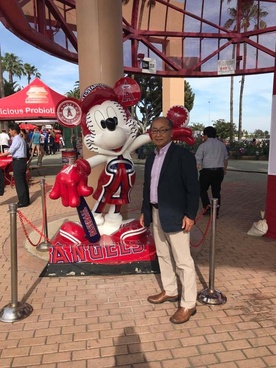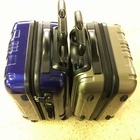"Be a businessman"
Michio Shimizu, president of Yakult USA, popularized Yakult, a health drink that was previously unfamiliar to people of Asian descent, in 49 of the 50 states. In 2011, Shimizu was transferred from his previous post in Singapore to Los Angeles, where he spent 10 years. In 2020, during the COVID-19 pandemic, he returned to Japan from Los Angeles and resigned from Yakult headquarters, relocating to his hometown of Kirishima City, Kagoshima Prefecture. His purpose was to live with his mother, who he had been living away from for a long time.
"However, my mother passed away 10 days before I received orders to return to Japan. She was 96 years old. I had wanted to live with my mother, even if only for a year, or even a few months. We only lived together until I was 17, when I went to university. When I went to Singapore, I asked my mother to wait for me until I returned, and she gave me permission. My father passed away three years after I was posted to Singapore. And when it was my mother's turn, I also couldn't return to Japan in time."
After Singapore, Shimizu was transferred to Los Angeles, where he had many things to do as the representative of the US corporation. "First, we opened a factory for Yakult in the US. In order to distribute a sufficient amount, we needed to produce domestically. In 2015, we opened a factory in Orange County and expanded the distribution states, starting with the West Coast and then the East Coast. We wanted to expand to all 50 states, but we couldn't reach an agreement with a business partner in that state, so we were only able to enter one state." Currently, Yakult distributes about 40 million bottles a day around the world. Of these, by achieving domestic production in the US, it is now possible to distribute 400,000 bottles a day. When Shimizu was transferred, the company was only selling 100,000 bottles a day, and the area where it was sold was only six western states.
He also reflected on the struggles he faced in getting Americans to accept lactobacillus drinks, which are unfamiliar to them. "The preventive medicine concept of drinking beneficial bacteria and managing your health with them was hard to understand in America. America has a Western medical culture where you treat symptoms when they appear."
However, after much hard work, Yakult's name recognition in America gradually increased. And the person who was instrumental in boosting the brand's power in America was Shohei Ohtani, a baseball player for the Los Angeles Angels.
"The Los Angeles Angels had an advertising manager named Drew, and in 2015 and 2016 we put up a Yakult sign in the stadium for two years, but the following year, in 2017, he approached us about a three-year contract. So we put up a big Yakult sign in the stadium, and Ohtani joined the Angels at the end of 2017. And the better he performed, the more effective our sign became in promoting the team. We were so lucky."
Shimizu-san lived in the United States as an expatriate, but his story exudes a passionate entrepreneurial spirit. He himself says, "When you are sent overseas by your company, you shouldn't just think that you can enjoy your time abroad. If you don't fulfill your duties with the awareness and sense of responsibility of a businessman, you can't expect to grow in business or as a person."
Learn about your hometown
With a number of accomplishments such as opening a factory in America, distributing products to 49 states, and improving the brand image by placing an advertising billboard at Angel Stadium, Shimizu left America after spending 10 years there. He had initially planned to return to his hometown with his mother, but as mentioned above, he was unable to return to Japan in time due to his mother's death, and now he lives alone with his beloved golden retriever that he brought back from America in an apartment that allows large dogs as indoor dogs.
"There are few rental properties in Japan that allow you to live with a large dog, so we made inquiries at about 80 properties before finally finding one to rent. My wife lives in the Kanto region to take care of her mother. Our eldest daughter is in Scotland, and our second daughter is in California." Shimizu's family is scattered all over the world. He said he thought about buying a house for his dog, but he is still uncertain about whether he will be able to continue living in his hometown, so he continues to rent.
So how does Shimizu view his hometown, where he has returned after almost half a century, and his life in Japan, where he has returned after 20 years? "In Japan, administrative procedures are very thorough. Moreover, I think it is efficient, unlike in America, where documents are presented separately and procedures take a long time to complete all at once. One thing that bothers me is that Japanese people are kind and helpful to people they know, but they don't say hello to strangers. In America, they smile when you make eye contact with them, but here, even if I say "hello" to a stranger while walking my dog, they ignore me. They treat me like a suspicious person (laughs)." Shimizu also says that he is concerned about the Japanese characteristic of being hesitant to express personal opinions.
When asked if he was currently involved in any local clubs or anything, he replied, "I wanted to learn as much as I could about my hometown, which I left at the age of 17, and to interact with the local people, so I joined a city-run ``Shrine Tour Club'' and am active in that. Kirishima City has many shrines with rich history and legends, and every month, on the second Thursday, we visit four or five shrines at a time, with a group of about 30 people, while a history teacher gives explanations to us."
So, as Shimizu-san lives his daily life in his hometown overlooking Mount Sakurajima with his beloved dog, I asked him, "What do you miss most about California?" To which he immediately replied, "My daughter in Santa Barbara. I miss her."
© 2022 Keiko Fukuda







